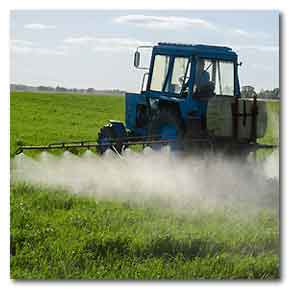|
Pesticide exposure in farmworkers from agricultural
communities is associated with changes in the oral
microbiome: Public Health investigators lead 1st
study to demonstrate effect in humans.
The research is published November 11th in Applied
and Environmental Microbiology, a journal of the
American Society for Microbiology.

Investigators sampled oral swabs from 65 farmworkers
and 52 non-farmworker adults in Washington state's
Yakima Valley, a major northwest produce area.
In the study, the investigators sampled oral swabs
from 65 farmworkers and 52 non-farmworker adults
from the Yakima Valley (Washington) community
agricultural cohort during the spring and summer
(2005), when farmworkers can undergo high pesticide
exposures while working in recently sprayed
orchards, thinning the fruit and pruning; and during
winter (2006), when exposures are quite low.
Concurrently, they measured blood levels of
organophosphate pesticides in the study subjects.
The most important finding was that among those
farmworkers in whom the organophosphate pesticide,
Azinphos-methyl was detected in the blood, the
researchers found “significantly reduced abundances
of seven common taxa of oral bacteria, including
Streptococcus, one of the most common normal
microbiota in the mouth,” said first author, Ian B.
Stanaway, a PhD candidate in Environmental
Toxicology in Elaine M. Faustman’s lab at the
University of Washington, Seattle. Changes in
populations, species, and strains of Streptococcus,
as well as from the genus, Halomonas, remained
particularly low during the following winter.
The investigators also saw a pesticide-associated
spring/summer general reduction in bacterial
diversity in the study subjects, which persisted
into the winter,suggesting that “long-lasting
effects on the commensal microbiota have occurred,”
according to the report.
Predictably, farmworkers had greater blood
concentrations of pesticide, and greater changes in
their oral microbiota than local, non-farmworking
adults.
“The challenge becomes, what does this mean,” said
principal investigator Faustman, PhD, Professor in
the department of Environmental and Occupational
Health Sciences. “We don’t know,” she said, adding
that “we depend on the micriobiome for many
metabolic processes.”
Nonetheless, “in other studies, different species
and strains of Streptococcus have been associated
with changes in oral health,” noted Stanaway.
The study subjects’ enthusiasm for the research has
been important to its success, said coauthor Beti
Thompson, PhD, Professor, School of Public Health,
University of Washington. The investigators have
followed the study participants for more than ten
years, she said. “They are very interested in all
the effects of pesticides. They have contributed
thousands of urine samples, tens of cheek cell
samples, blood samples, saliva samples, and house
and vehicle dust.”
For more information
Human Oral Buccal Microbiomes Are Associated with
Farmworker Status And Azinphos-methyl Agricultural
Pesticide Exposure
Link...
American Society For Microbiology
Link...
MDN |